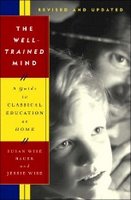 The Well-Trained Mind
The Well-Trained Mindby Susan Wise Bauer and Jessie Wise
This book is a guide to Classical Education, the method which we will mostly use for Tania. (Unless of course it doesn't work, then we'll have to abandon it and go for Plan B. We haven't figured out Plan B yet.) When I say "mostly use," I mean that we will pretty much follow it to a tee, but I disagree with some of the things the authors emphasize. For example, I don't see any value in refusing my child the opportunity to read the books she chooses. Reading should be enjoyable, and Joey and I read the books we like, so why shouldn't Tania read the books she likes? It's not a big thing to me, because Tania has excellent taste in literature, but that advice kind of annoyed me. Another thing I don't like much is the Christian emphasis, so we'll be leaving that out. Accordingly, we have to tailor some of the lessons to include other secular ideas and works. The authors also believe that art and music lessons can be held off until 5th grade. This will never work for us, because Tania is too in love with those subjects for us not to put any importance in them. They also believe that learning languages at an early age is useless unless someone in the house is bilingual, and recommend putting it off until high school. I just don't believe this. I think now is the time to learn vocabluary and the conversational aspects of foreign langauges. Grammar can wait until later.
Other than that, I really like the emphasis on good literature and learning history in a logical order. I also like that I have something to follow. It gives Tania and me a sense of purpose.
Here are the basics of Classical Education:
Children are taught according to a "trivium," or three segments of learning: Grades 1-4 are the "grammar" stage, Grades 5-8 are the "logic" stage, and Grades 9-12 are the "rhetoric" stage. Briefly, the "grammar" stage is when children best soak up information and learn facts; the "logic" stage is when children begin to question the "whys" in life and recognize whether arguments are valid or invalid; the "rhetoric" stage is when children learn to effectively form and argue their own opinions.
Emphasis is on the "Great Books" of important literature. It is important for children to work their way through these great works, and not be fed information through media sources.
History is taught chronologically in four segments and repeated in each trivium stage: the Ancients, Medieval Times, Renaissance to Early Modern Era, and Early Modern to Modern Era.
Science is taught in four segments and repeated in each trivium stage: Biology, Earth Science and Astronomy, Chemistry, and Physics.
That stuff all sounds good to me. I can see in Tania how she is in the "grammar" stage. She loves showing off the facts she learns, and she loves learning new facts. She likes memorizing and being quizzed.
I am worried about the time commitment. It seems like a lot of work. But when I think about how much time she spends at school, a few hours per day of homeschool doesn't seem like much. So that's the plan for now. I don't want to be naive and think that it's definitely going to work, but it seems like something that can work for our family.



No comments:
Post a Comment